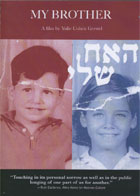
My Brother 2007
Distributed by Women Make Movies, 462 Broadway, New York, NY 10013; 212-925-0606
Produced by Cohen Gerstel Productions
Directed by Yulie Cohen Gerstel
DVD, color, 58 min.
Sr. High - Adult
Jewish Studies, Religious Studies, Middle Eastern Studies
Date Entered: 06/11/2008
Reviewed by Sharon Whitfield, Multimedia Librarian at Christopher Newport University“How can peace in the Middle East prevail, if it cannot in a family?” This haunting question is the foundation of Yulie Cohen Gerstel’s third long form documentary, My Brother. My Brother chronicles Gerstel’s attempts to reconnect with her ultra-Orthodox brother after twenty-five years of separation. Longing for a connection to her brother, Gerstel writes letters to him, but they go unanswered. She then travels to Bnei Brak, an orthodox city near Tel Aviv, to understand the ultra-Orthodox culture and their thoughts on the Second Israeli-Lebanon War. Although Gerstel is told that reconnection with her brother is hopeless, Gerstel persistently tries to bridge the “two different worlds” and “understand the other language” of her ultra-Orthodox brother.
Gerstel’s film is very personal. She draws the audience into her family setting with letters to her brother, family slides, pictures of her childhood home and glimpses of everyday life for Yulie Gerstel and her daughters. From her divorce to her mother’s malignant tumor, Gerstel hides nothing from the audience. It is the sincerity of the creator and the eye-level film shots, which creates an intimate connection between the creator and the audience.
My Brother is thought provoking, but lacks the answer to the most basic question for a viewer-why was this family driven apart by her brother’s decision. Clips of Gerstel’s father calling the ultra-Orthodox movement “cult-ish” attempt to answer the question, but Gerstel does not explain why she alienated her brother for his decision. Did she find the differences between secular Israel and an ultra-Orthodox Israel unable to overcome? Gerstel weakly explains the differences in the sects of Judaism by discussing her disconnect with her brother amongst former ultra-Orthodox friends; however, only inferences are made to the differences in their beliefs and the audience is left ignorant as to whether it was those differences that drove them apart.
Gerstel is a gifted director and storyteller, but it is her colleague Oded Kirma, the camera man, whose work creates smooth cinema. Oded Kirma’s camera angles allow the audience to feel in the backseat of the car while Gerstel drives through Bnei Brak, on the couch in the living room looking at slides and at the table as they look through Orthodox books. These camera angles befriend the audience with Gerstel and her family. Overall, the quality of the film is impeccable.
Although My Brother is a film that is “Recommended”, there are some reservations with adding this film to a collection. Since the film is provocative, it can begin discussion on the sects of Judaism or the Middle East peace process, but the film is not terribly informative on either topic. It is for this reason that one may have reservations in adding this film to their collection.